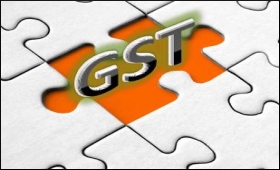|

|
Petroleum, alcohol should be kept out of GST: Panel
|
|

|
|
| Top Stories |
 |
|
|
|
SME Times News Bureau | 19 Nov, 2013
The Empowered Committee of State Finance Ministers Monday decided to oppose inclusion of petroleum products, alcohol and entry tax of goods in the proposed unified Goods and Service Tax (GST) regime across the country.
"We have decided to recommend the central government to exclude petroleum products and alcohol out of the GST ambit as most of the states were opposing it," Abdul Rahim Rather, who headed the Empowered Committee, told journalists Shillong after the panel's meeting.
He said the states were opposed to including these two items under the GST regime since these are the major sources of their revenue. "These are the major sources of income for the states and if they (petroleum and alcohol) are included in the GST, the states will stand to lose a lot," Rather added.
In its revised draft of the constitution amendment bill, the central government proposed that petroleum and alcohol should be brought under the ambit of the GST, but the Empowered Committee was of the view that there was no requirement for inclusion of GST in either the Union List or State List of the Constitution.
"The Empowered Committee opined that the proposed inclusion of Article 246A in the Constitution, which empowers Parliament and State legislatures to make laws on GST, was adequate," Rather said.
The two-day meeting of the GST panel was attended by the finance ministers from Gujarat, Uttar Pradesh, Bihar, Punjab, Assam, Nagaland and Tripura, besides government officials representing their respective states.
"India is a federation, and nothing should be done which would go against the spirit of federalism," he added.
Rather said the committee has decided that there should be no provision to empower the central government on declared goods.
"Entry tax or taxes levied on goods while entering a state should not be subsumed under the GST to protect interest of local bodies. Octroi, levied in Maharashtra, is an example of an entry tax that is levied by local bodies," he said.
The panel also resolved to recommend to the centre to set up an independent mechanism to pay compensation to states that stand to lose with the introduction of the GST.
"Compensation should be paid to states, which will lose on account of Goods and Services Tax, and therefore, in this regard, the Empowered Committee of State Finance Ministers has pitched for the institution of a dedicated mechanism," said Rather, who is also the Finance Minister of Jammu and Kashmir.
Finance Minister P. Chidambaram had earmarked Rs.9,000 crore in the annual budget for compensating state governments in case of any loss due to the change in tax structure following the implementation of the Goods and Services Tax (GST).
"We welcome the announcement made by union Finance Minister P. Chidambaram in this year's Union Budget that Rs.9,000 crore has been earmarked as the first installment of compensation for losses incurred by states due to reduction in the Central Sales Tax rate, a precondition for the rollout of the GST," Rather said.
GST is a major tax reform aimed at bringing uniformity in indirect tax structure across the country by replacing state-level value added tax, excise duty and service tax.
The central and the state governments have been discussing the indirect tax reforms for the last four years.
The government has already missed two deadlines for rolling out the GST system from April 1, 2012.
|
|
|
| |
|
|
|
|
|
|
|
Rediculous
Binoy Jha | Tue Nov 19 16:25:08 2013
GST is not acceptable as it may reduce corruption of many layers to blame each other and keep bribes a way of life,.

|
|
|
|
|
|
|
| |
| Customs Exchange Rates |
| Currency |
Import |
Export |
US Dollar
|
66.20
|
64.50 |
UK Pound
|
87.50
|
84.65 |
Euro
|
78.25
|
75.65 |
| Japanese
Yen |
58.85 |
56.85 |
| As on 13 Aug, 2022 |
|
|
| Daily Poll |
 |
 |
| PM Modi's recent US visit to redefine India-US bilateral relations |
|
|
|
|
|
| Commented Stories |
 |
|
|
|
|
|
| |
|